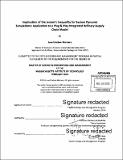| dc.contributor.advisor | Richard de Neufville. | en_US |
| dc.contributor.author | Montero, Juan Esteban, S.M. Massachusetts Institute of Technology | en_US |
| dc.contributor.other | System Design and Management Program. | en_US |
| dc.date.accessioned | 2015-12-16T16:34:25Z | |
| dc.date.available | 2015-12-16T16:34:25Z | |
| dc.date.copyright | 2014 | en_US |
| dc.date.issued | 2014 | en_US |
| dc.identifier.uri | http://hdl.handle.net/1721.1/100363 | |
| dc.description | Thesis: S.M. in Engineering and Management, Massachusetts Institute of Technology, Engineering Systems Division, System Design and Management Program, 2014. | en_US |
| dc.description | Page 113 blank. Cataloged from PDF version of thesis. | en_US |
| dc.description | Includes bibliographical references (pages 60-65). | en_US |
| dc.description.abstract | This investigation studies how critical is the effect of considering uncertainty to a dynamic model because of Jensen's Inequality. This is done using as an example the supply chain of a refinery, which illustrates that the difference between probable and expected results can be significant, arguing that the distributions and probabilities can be dramatically different from the expected-planned value. Moreover, this research discusses that, from the perspective of the dynamics of the system, the mode of behavior can vary considerably as well, leading managers to dissimilar situations and contexts that will inevitably produce different decisions or strategies. Supply chain management is a critical aspect of any business. The energy industry is a particularly relevant example of a global supply chain, representing a crucial challenge the management of complexity and relevance for the overall performance of the business. The complexity of managing the supply chain of an energy company is produced by the physical size, diversity of operations and products and dynamics of the system, among many others causes. On top of the intrinsic complexity of the business itself, the manager of a supply chain should also consider the complexity of the models and methodologies used to make decisions about it. These models and methodologies are diverse and they serve different purposes under certain assumptions. This study also discusses the complexity faced by supply chain managers, presenting a compilation of bibliographic research about different considerations and approaches. Managers often employ models and analytics to simplify the complexity and produce intuition by different means in order to form their decisions and strategies. The analysis of the effects of uncertainty on the results and behavior of a dynamic simulation model is done by stochastically simulating an already-developed -plug & play- dynamic model of a refinery. This approach permits the exploration of different configurations, considering different definitions of uncertainty, analyzing and comparing their particular results. | en_US |
| dc.description.statementofresponsibility | by Juan Esteban Montero. | en_US |
| dc.format.extent | 113 pages | en_US |
| dc.language.iso | eng | en_US |
| dc.publisher | Massachusetts Institute of Technology | en_US |
| dc.rights | M.I.T. theses are protected by copyright. They may be viewed from this source for any purpose, but reproduction or distribution in any format is prohibited without written permission. See provided URL for inquiries about permission. | en_US |
| dc.rights.uri | http://dspace.mit.edu/handle/1721.1/7582 | en_US |
| dc.subject | Engineering Systems Division. | en_US |
| dc.subject | System Design and Management Program. | en_US |
| dc.title | Implication of the Jensen's inequality for system dynamic simulations : application to a plug & play integrated refinery supply chain model | en_US |
| dc.type | Thesis | en_US |
| dc.description.degree | S.M. in Engineering and Management | en_US |
| dc.contributor.department | System Design and Management Program. | en_US |
| dc.contributor.department | Massachusetts Institute of Technology. Engineering Systems Division | |
| dc.identifier.oclc | 931543630 | en_US |
